What Facebook and Twitter think they know about you
It should not come as a surprise that the digital services you use—Facebook, Google, Snapchat, Twitter, Yahoo, and more—keep a profile of you that they use to sell to advertisers. Those advertisers can better target their ads to you based on your likes and preferences. This is how these businesses make money, because you don’t pay them.
Many people are vaguely aware of this, accepting it without much thought as the cost of using these “free” services, but you can actually see how these companies view you based on the data they collect about you. As a commodity, “users,” as the industry often calls them, are far more valuable with data. Without it, a user looks like a Twitter egg—everything about them is unknown—and it’s hard for a company to buy an ad if you can only verify your users are Homo sapiens.

Fortunately for these companies, users give them a lot of data. Depending on your privacy preferences and policies, your important data—emails, Facebook posts, searches, Instagram story views, recordings of you by Google assistant—may or may not be shared with advertisers, but the companies still create a dossier.
What most people don’t realize is you can actually see what these companies think of you – based on your browsing history, who and what you follow on Twitter, what content you create, what ads you click on, and more. Your profile, or part of it, is open to you to correct or tailor.
Twitter just released a new privacy policy this week, detailing what it will share with advertisers to tailor ads to users. It also described how you can opt out and change your ad settings.
It all starts on this page, called “Your Twitter Data” under “Settings.” I took a look at my profile, and at first glance, it looks pretty normal, with email, phone number, and all the info I gave the service when you signed up, which for me was April 30, 2010 at 9:11 PM. Twitter guesses my age (“13-54”). It knows the places I’ve been, thanks to IP addresses (“to show you more relevant content”), and which wireless provider I use.
Then it gets weird. Since I, like most people, do not read the thousands of fine print pages of end-user agreements, privacy policies, and other long documents thrust upon me by tech companies, I did not realize the Twitter app looked at its fellow apps on my phone. They’re all there, 105 of them—bank apps, fitness apps, news apps, etc.
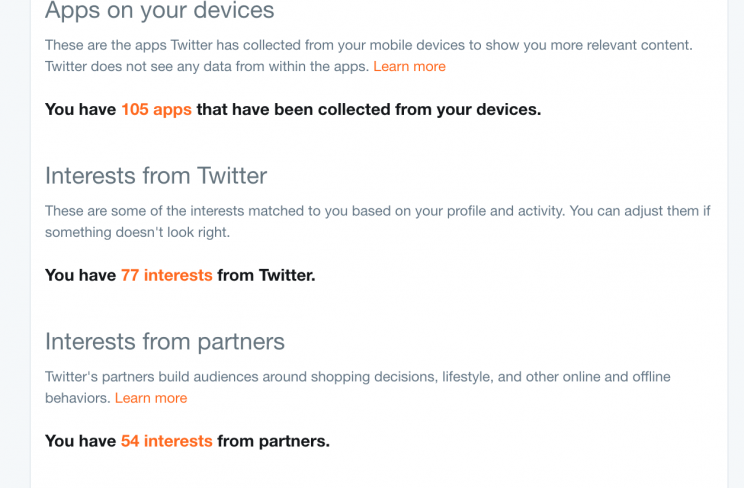
From these apps and who I follow, Twitter has tried to peg me, and lists my “interests.” I have 77 interests: It’s a long list, from “Action and adventure,” to “Gov Officials & Agencies,” to “Weird.”
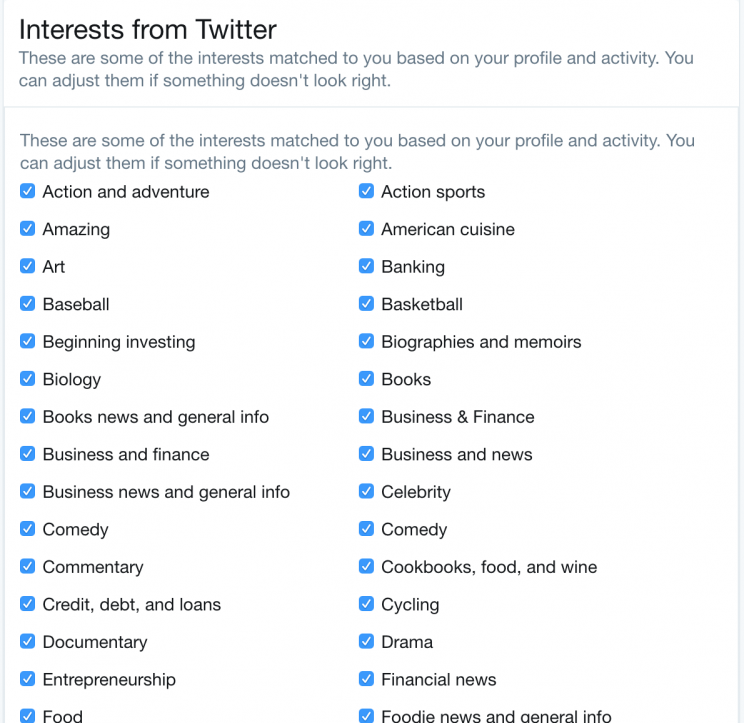
Besides the “interests” Twitter thinks its users have, it divines more information to nail down the demographics. Under “Interests from partners,” you can see how advertisers might assess whether you’re worth paying for a billboard to be thrown in front of you. For example, I’m apparently “Likely to dine at Chipotle Mexican Grill” and may be worth $1,000,000. I may also be an “affluent couple without kids.” (Note that part of my job at Yahoo Finance is reading and researching financial content all day.)
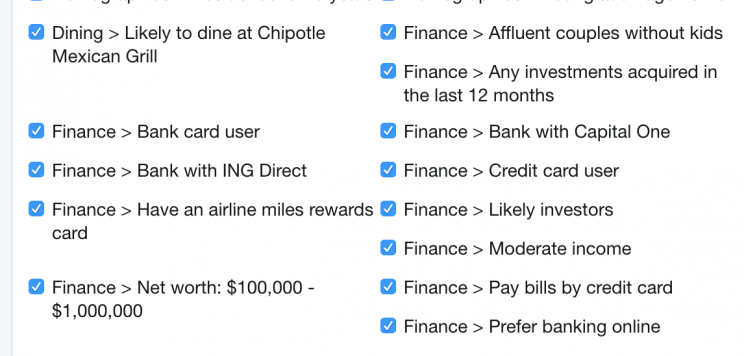
Much of this is wrong but that doesn’t matter. Advertisers pay Twitter to show me ads. And you can see how many of them there are—1,888 brands, who have grouped me into one of 7,977 “audiences,” which are demographic types of consumers. You can ask Twitter to email you the list of the advertisers. While familiar brands like American Express and Hyndai are present, there are many, many I haven’t heard of.
The Facebook side of things is similar to Twitter, but perhaps more accurate because people often reveal more on Facebook (you can set your profile to be viewed only by your friends or by the general public).
Finding where everything is can be somewhat of a moving target; the easiest way is probably to do a search for “Facebook help center.” On one of its help pages, “Accessing Your Facebook Data,” you can see all the things Facebook keeps track of—stuff you don’t even realize. All the stuff you’ve “liked.” Metadata from your photos (when they were taken, filters, and more). Ads clicked. Under “settings” you can download all your data.
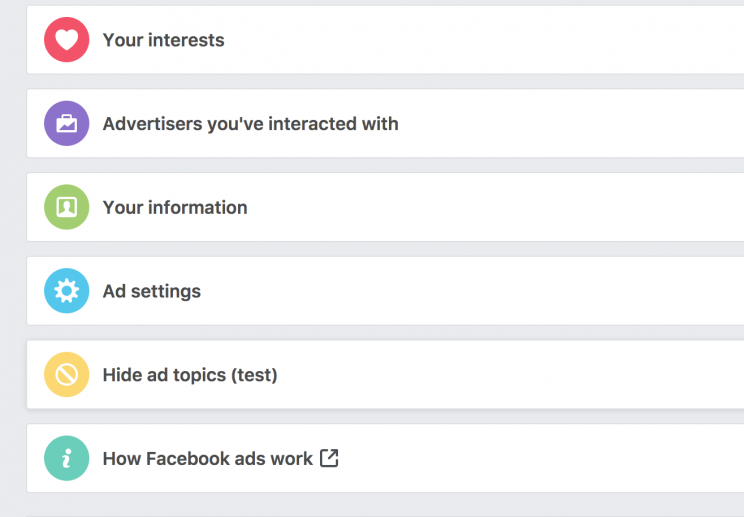
From all this information, like Twitter, Facebook draws a picture of you—or rather, gets you to draw yourself. Under “Your ad preferences” in the “settings” menu, you can see six groupings of information. The first is “Your interests” and it shows you what it thinks you like. If you mouse over, Facebook tells you why. This comes from what you’ve liked on Facebook—pages or posts—or ads you’ve clicked on.
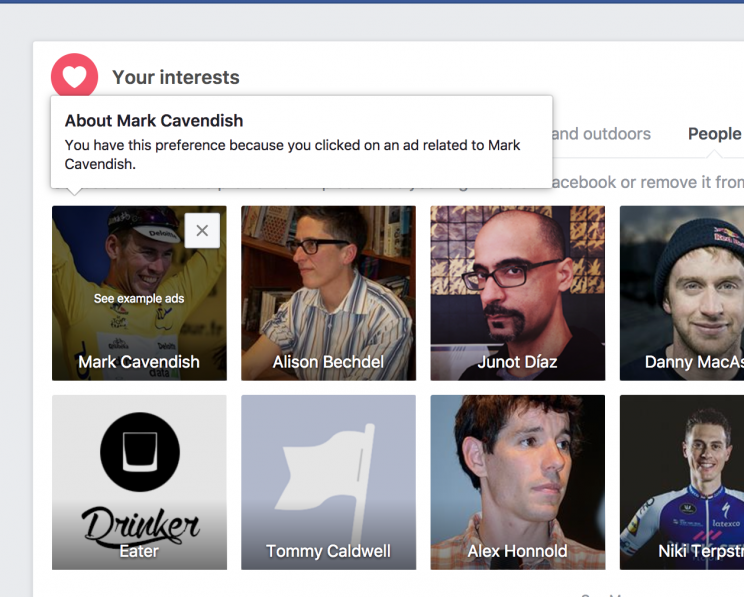
The tab is a little weird, because it shows you advertisers “with your contact info.” I have two, Amazon and Nicorette & NicoDerm CQ. I use Amazon, but I don’t know anything about the quitting smoking products. I don’t smoke cigarettes and the only reason I can think of as to why Facebook thinks I’m an old timey Tour de France guy—smoking while riding up giant mountains—is because my cover photo was literally old timey Tour de France guys smoking up a giant mountain. (To clarify, I am not one of those people.) Apparently, Facebook’s photo-scanning technology is very impressive, but the algorithms that come after aren’t quite there yet.
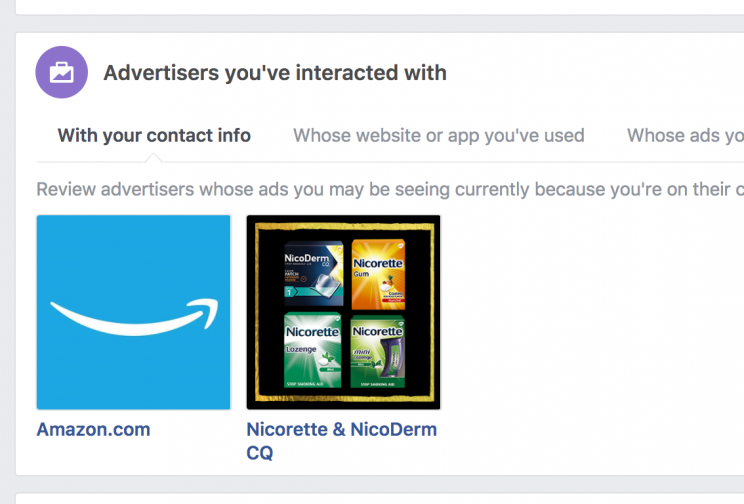
Next to the advertisers with your contact info are websites you’ve used and ads you’ve clicked on. I don’t know why, but apparently I’ve clicked on ads for movies, media companies, and weirdly, for Volkswagen. Since Facebook can tell VW I’ve clicked on its ads, I can earn them more money.
You can find Facebook’s broader generalizations about who you are under the next tab, “Your information.” In the “Your categories” selection, you can see how they identify you: what kind of phone you use; whether you use Gmail or Yahoo mail; your political leanings; whether you’re a frequent traveler; whether you own a tablet; if you’re a “technology late adopter” or an “early adopter.” And most interestingly, what Facebook thinks your political leanings are.
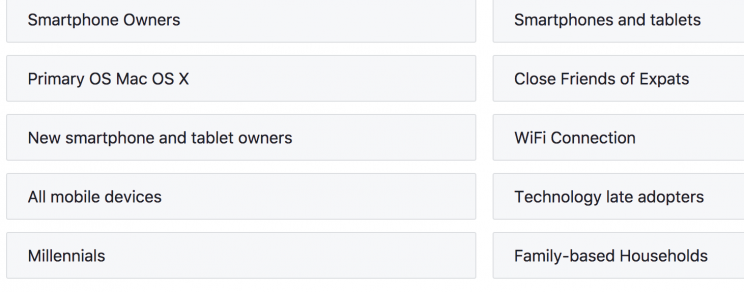
All this brings up the point: Do you want to correct all the incorrect assumptions? The urge is there to say no, I’m not a Euro-Marlboro man who rides a bike instead of a horse. No, I’m not “very conservative” or “very liberal.” No, I’m not a married couple without kids.
But correcting these companies is exactly why these companies share your profile with you. It’s not for your own edification, it’s so you will correct them so they can show you more carefully tailored ads that will eventually convince you to buy stuff. As a personal finance tip, the less-tailored your ads are the better.
Google has given its users many opportunities to opt out of stuff, like it keeping track of your searches, your YouTube history, the audio recordings it makes when you ask its voice assistants stuff. Under “Ads settings” in under “My account” you can see your ad personalization—your profile to advertisers. If you, like many people, have elected to limit the data Google collects and shares, the page may be pretty muted. I have ad personalization turned off, so there are no “topics you like” or “topics you don’t like” under my profile. There is simply “male 25 to 34.”
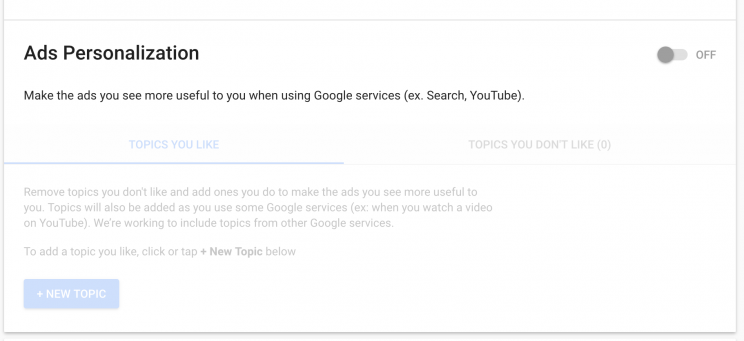
Of course, there are other ways Google sells its advertising, with web tracking like “re-targeting,” which is when you look at something on Amazon and then see the item following you around the internet. And at the bottom of Google’s ad preference page, under “visit ad choices,” you can see how this works, and turn off ad personalization for millions of websites.
If you click on that, you can get a big list of all your ad choices. And opt out if you want to, telling many dozens of advertising companies that you don’t want them to pepper your browser with cookies that track your browsing to give you ads.
Ethan Wolff-Mann is a writer at Yahoo Finance focusing on consumer issues, tech, and personal finance. Follow him on Twitter @ewolffmann. Got a tip? Send it to tips@yahoo-inc.com.
Read more:
Airlines are giving crews leeway to hand out money when necessary
Banks take just 90 seconds to approve a credit card. Here’s what they look for.
Uber’s new tipping dilemma: low prices or smooth experience
Zuckerberg at Facebook conference: if you take one thing away—this is it
The cost of unifying North and South Korea
The trick to getting credit card fees waived? Just ask
Chase’s Sapphire Reserve is very worth it, even with its slashed bonus

